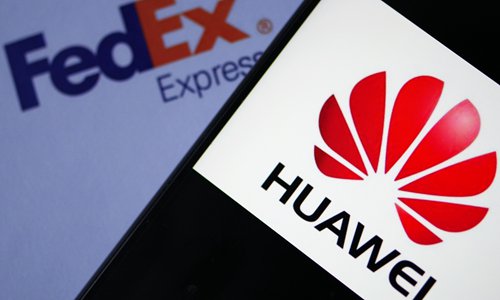China’s ‘unreliable entity list’ imminent
Companies listed will face severe punishment: analysts

China is preparing to launch a widely anticipated "unreliable entity list," the Ministry of Commerce (MOFCOM) said Thursday, as expectations for the mechanism to severely punish companies that have undermined China's national interests continue to grow.
While initiated as a response to the US crackdown on Chinese tech companies, the mechanism, once launched, could also be deployed to punish companies that hurt China's sovereignty regarding Taiwan and Hong Kong, and the punishment could be crippling given China's massive economic power, Chinese analysts noted.
The "unreliable entity list" mechanism is currently going through internal deliberations and "will be announced in the near future," Gao Feng, a spokesperson for MOFCOM, told a press briefing on Thursday.
Gao did not provide a timetable for the release of the list, first announced in May and widely viewed as China's response to the US "entity list."
The US has used the list to crack down on Chinese companies such as Chinese tech giant Huawei Technologies.
Aiming to increase pressure on Huawei, the US Commerce Department Monday added 46 affiliates of the Chinese telecom giant to its "entity list."
Gao reiterated Thursday China's firm opposition to the US move to "deploy" its state power to crack down on Chinese companies "without any justification."
More candidates
Gao's comment comes as an increasing number of foreign companies have drawn Beijing's ire for allegedly conspiring with the US government to undermine China's national interests.
The latest case is US courier delivery company FedEx, under investigation in China after a package that FedEx delivered was found to contain a handgun.
The company has also been accused of helping the US crack down on Huawei after it misrouted packages belonging to the Chinese company.
Asked whether FedEx will be included in the "unreliable entity list," Gao said that officials will consider four factors which have been previously disclosed.
The factors include whether the entity is engaged in other discriminative actions such as cutting supplies, whether the entity violates market rules and breaches contracts for non-commercial reasons, whether the entity damages Chinese companies and whether the entity threatens China's national security.
Many companies, including US suppliers of Huawei, meet those standards.
UK-listed bank HSBC has also been floated as a potential target after it was reported that the bank had conspired with US officials in the case against Huawei.
Standard Chartered, Citigroup and French Bank BNP have also been reported as playing a role in the case.
The scope of the "unreliable entity list" will not be limited to the Huawei case as other foreign companies have also been accused of undermining China's national security regarding "secessionist actions" in Hong Kong and arms sales to Taiwan, Bai Ming, a research fellow at MOFCOM's Chinese Academy of International Trade and Economic Cooperation, told the Global Times on Thursday.
"Those who ignore or challenge the one-China principle will all fall under its scope," Bai said.
Companies in Hong Kong including airline Cathay Pacific, as well as Amazon, Facebook and Twitter, have all been criticized for supporting violent protesters in Hong Kong.
The Ministry of Foreign Affairs on Wednesday said that China could impose sanctions on US companies involved in arms sales to Taiwan.
Severe punishment
Companies included in the "unreliable entity list" could face a potentially crippling punishment from China, which wields great power in the global economy, Chinese analysts said.
"Being added to the list will make a big dent on their businesses development not only in China but also in other markets where they have operations. For example, fundraising in local markets will be impacted," said Gao Lingyun, an expert with the Chinese Academy of Social Sciences in Beijing.
Punitive measures could include hefty penalties, cancellation of business licenses that are compulsory to do business in China, and a temporary or permanent ban from the Chinese market, Gao said.
The ban from doing business in the massive Chinese market alone could mean huge losses for many of the companies that rely heavily on revenues from China, Gao noted.
Chinese officials stressed the move was not aimed at those that operate within the law, and China still welcomes foreign companies to conduct business.
The delay in the launch of the mechanism could also mean Chinese officials are trying to take a balanced approach and minimize collateral damage, analysts said.
"According to my observation, the MOFCOM is soliciting inputs among related departments on the list. The ministry will revise it based on the advice and launch it soon," said Gao Lingyun.
Gao noted that China will likely launch the mechanism first instead of listing the companies.
"The list is not that difficult to generate but we need to take multiple factors into consideration," Huo Jianguo, a vice chairman of the China Society for World Trade Organization Studies, told the Global Times.
China is likely waiting for an appropriate time to unveil the list, Huo said.